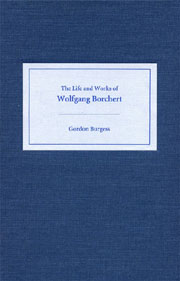Book contents
- Frontmatter
- Contents
- Acknowledgments
- List of Abbreviations
- Introduction
- 1 Childhood, School, Apprenticeship: 1921–1940
- 2 “The Happiest Time of My Life': January–June 1941
- 3 The Eastern Front and Courts-Martial: 1941–1943
- 4 Actor Turned Writer: Jena, Hamburg, and Basel: 1944–1947
- 5 The Poems
- 6 Draussen vor der Tür
- 7 The Short Stories
- 8 The Reception of Borchert's Life and Works
- Conclusion
- Published Works Cited
- Index
Introduction
Published online by Cambridge University Press: 05 February 2013
- Frontmatter
- Contents
- Acknowledgments
- List of Abbreviations
- Introduction
- 1 Childhood, School, Apprenticeship: 1921–1940
- 2 “The Happiest Time of My Life': January–June 1941
- 3 The Eastern Front and Courts-Martial: 1941–1943
- 4 Actor Turned Writer: Jena, Hamburg, and Basel: 1944–1947
- 5 The Poems
- 6 Draussen vor der Tür
- 7 The Short Stories
- 8 The Reception of Borchert's Life and Works
- Conclusion
- Published Works Cited
- Index
Summary
Auslöffeln, aussaufen, auslecken, auskosten, ausquetschen will ich dieses herrliche heiße sinnlose tolle unverständliche Leben!
(GW 56)THESE WORDS FROM Wolfgang Borchert's short prose text “ Gespräch über den Dächern” were written from the heart. Borchert was born in Hamburg on 20 May 1921, and died on 20 November 1947. His passion for life never left him, whether he was in military service on the Russian front, languishing in German military prisons under the Nazi regimes, or being treated in a succession of military and civilian hospitals.
Looking back, 1921 was not a good year to have been born. The Weimar Republic, established in 1918, was to get progressively weaker as rampant inflation led to the Great Slump, and ended with the takeover of Hitler's National Socialist Party in 1933. For the next twelve years, Germans lived under fascism. On the one hand 1945 brought liberation, but, on the other, Germany became an occupied and subsequently a split country. The immediate postwar years saw deprivation and hardship for ordinary citizens, caused partly by the physical destruction of the country, partly by shortages of everything from foodstuffs to paper to fuel, partly by conditions imposed by the occupying allied armies, and even partly by the atrocious winter of 1946.
These were the times Borchert lived through. After doing badly at school, he trained, on the insistence of his parents, as an apprentice in a bookshop. But after witnessing one of the great German actors of the period, Gustaf Gründgens, playing Shakespeare’s Hamlet in December 1937, he wanted to do only one thing: become an actor himself. While continuing to work in the bookshop, he took private acting lessons. He qualified as an actor in March 1941, and immediately got a position with a professional traveling troupe from early April to early June. He was later to refer to these two months as the happiest time of his life, and, indeed, from then on his life was to be subjected to the deprivations of military service, imprisonment, and illness.
- Type
- Chapter
- Information
- The Life and Works of Wolfgang Borchert , pp. 1 - 8Publisher: Boydell & BrewerPrint publication year: 2003

